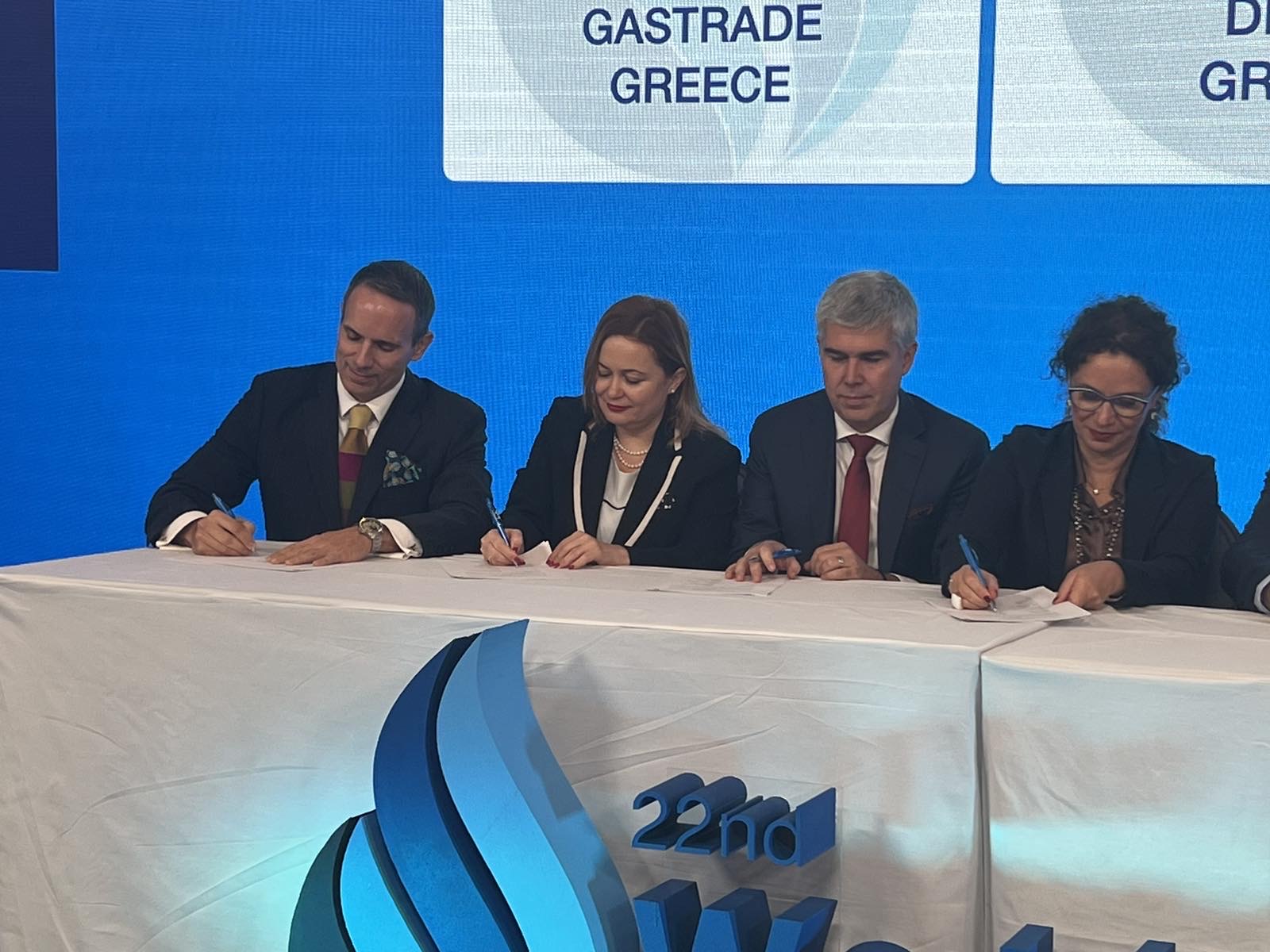ICGB Executive Directors Teodora Georgieva and Georgios Satlas highlighted the opportunities for development of the Vertical Gas Corridor as a result of the successful commissioning of the gas interconnector, contributing to energy security and sustainability with the region. According to them, the role of IGB in this aspect will be even more significant when the total capacity of gas transmission along the pipeline increases.
Representatives of ICGB AD (Bulgaria), Bulgartransgaz EAD (Bulgaria), DESFA S.A. (Greece), Gastrade S.A. (Greece), FGSZ LTD (Hungary) and SNTGN TRANSGAZ S.A. (Romania) signed the renewal of the Memorandum of Understanding on the implementation of the Vertical Gas Corridor. The meeting took place in Athens, Greece.
The adopted document aims achieving of cooperation between the companies regarding the realization of the Vertical Gas Corridor, which will interconnect the networks of Bulgaria, Greece, Romania and Hungary and will allow the transmission of natural gas. The improved connectivity of the transmission systems of the neighboring countries is in sync with the common European priorities in the energy sector – increasing energy security in the region, market integration through diversification of routes and sources of natural gas, as well as increasing competition.
The implementation of the Greece-Bulgaria interconnector, which will start commercial operation from October 1, 2022, is a key part of the Vertical Gas Corridor development project. The IGB gas pipeline connects the transmission networks of Greece and Bulgaria, providing a direct connection to the Trans-Adriatic Gas Pipeline (TAP) and thus making Bulgaria part of the Southern Gas Corridor. The quantities of natural gas transported through the interconnector since the beginning of October provide nearly 1/3 of Bulgaria's domestic consumption in the winter season. The new infrastructure creates opportunities to transfer natural gas to other neighboring countries in the region, as well as to Moldova and Ukraine.
ICGB Executive Directors Teodora Georgieva and Georgios Satlas emphasized the need for close cooperation between the countries of the region in order to improve energy connectivity and secure more sources of gas supplies.
"In the context of the changed energy environment and the security environment in the region, cooperation on the development and construction of new energy projects to guarantee diversified sources of gas becomes a top priority. We recognize the serious efforts that are being made at the national and European level in terms of improving energy connectivity and achieving energy independence," said Georgieva and Satlas during the event.
They highlighted the opportunities for development of the Vertical Gas Corridor as a result of the successful commissioning of the gas interconnector, contributing to energy security and sustainability with the region. According to them, the role of IGB in this aspect will be even more significant when the total capacity of gas transmission along the pipeline increases.
"Currently, the interconnector has a maximum total capacity of 3 billion cubic meters per year. In coordination with DESFA, we have the opportunity to increase this capacity to 5 billion cubic meters per year, which should happen in sync with the commissioning of the LNG terminal at the Greek city of Alexandroupolis in 2024," said the two ICGB executive directors.
The IGB project (Greece-Bulgaria Intersystem Gas Connection) is implemented by the mixed investment company "ICGB" JSC, registered in Bulgaria in 2011 with shareholders BEH JSC (50%) and IGI Poseidon (50%). The joint shareholder IGI Poseidon is a company registered in Greece, with shareholders the Greek company DEPA International Projects S.A. (50%) and the Italian energy group Edison S.p.A (50%).
In accordance with its charter, ICGB JSC is the owner of the IGB gas pipeline, financing its implementation, distributing its transmission capacity and receiving revenues from the transmission of natural gas.
The IGB gas pipeline is connected to the Greek national gas transmission system (DESFA S.A.) and the Trans-Adriatic gas pipeline (TAP AG) in the area of Komotini (Greece), and to the Bulgarian gas transmission system (Bulgartransgaz EAD) in the area of Stara Zagora. The total length of the gas pipeline is 182 km, the diameter of the pipe - 32'' - and a design capacity of up to 3 billion m3/year. in the direction of Greece-Bulgaria. Depending on the market interest in using a larger capacity and the possibilities of the neighboring gas transmission systems, the capacity is designed to increase to 5 billion m3/year. with additional construction of a compressor station.
Source: Diana Zaykova, 0885/074 422, 0885/614 131, Rositza Donkova, 0888/343 661

